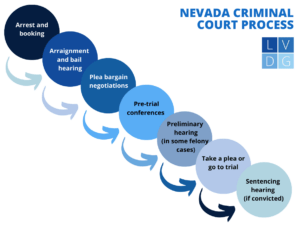
Sentencing is usually the last stage in a criminal case if you have been convicted. At your sentencing hearing, your lawyer argues for the laxest penalties and the D.A. argues for the harshest.
At the end, the judge will then decide on the final custody sentence, fines and any other terms.

In this article, our Las Vegas criminal defense attorneys discuss all you need to know about Nevada sentencing hearings:
- 1. What is a sentencing hearing in Nevada?
- 2. When does it happen?
- 3. How long do sentencing hearings last?
- 4. What are they like?
- 5. What will my sentence be?
- 6. What if I was convicted of more than one crime?
- 7. What if I have been convicted of crimes in the past?
- 8. If I am found guilty at trial, will my sentence be harsher than if I took a plea deal?
- 9. If I enter a plea bargain, does the judge have to grant it?
- 10. Can I remain out on bail until the hearing?
- 11. Can my family and friends testify on my behalf?
- 12. Can I appeal an unfair sentence?
- 13. Can I get a sentence commuted (reduced)?
- 14. Text of Nevada’s sentencing statute
- Additional reading
1. What is a sentencing hearing in Nevada?
Think of it this way. In a criminal trial there are two sides: Your side which claims you are innocent, and the prosecutors’ side which claims you are guilty. Then let us say that at the end of this trial the jury returns a guilty verdict.
So a sentencing hearing is similar to a trial in that the judge listens to the same two sides argue: Your attorney and the prosecutors. Though the issue here is not your guilt since that has already been decided. The only thing at stake is what penalties will be imposed on you.
Note that you do not need to plead guilty at trial to have a sentencing hearing. You also get one after you plead guilty or “no contest” to a crime as part of a plea bargain.
Sentences typically include one or more of the following terms:
- incarceration
- fines
- house arrest with electronic surveillance
- a suspended jail sentence, where you do not have to do jail unless you violate other terms the judge imposes
- rehabilitation programs and/or counseling
- educational classes like DUI School or a Victim Impact Panel
- an order to abstain from drugs or alcohol or to wear a SCRAM alcohol-detection device
- victim restitution payments
- probation, which is when you avoid jail but are required to follow various court orders such as submitting to random drug tests, searches and electronic monitoring
- an order to “stay out of trouble” (abbreviated SOOT), which means that you may not pick up any new arrests while the case is open.

In serious cases, you may have to remain in custody pending the sentencing hearing.
2. When does it happen?
It depends. Nevada law states that, “Sentence must be imposed without unreasonable delay.”2
If the crime was a misdemeanor, the hearing typically occurs right away or within a few days. This is because the maximum punishments for misdemeanors are relatively light: Six months in jail and/or $1,000 in fines.
If the crime was a felony, the hearing may not occur for three or more weeks. This is to give your attorney ample time to prepare because the potential penalties are much more serious. Felonies carry a minimum of one year in prison.
The hearing could also be delayed if
- your attorney is moving for a new trial,
- if the court needs to determine whether you are sane, or
- if the Nevada Department of Parole and Probation is late in turning in your pre-sentence investigation (PSI) in felony and gross misdemeanor cases.
A PSI is a biographical report about you to help the judge determine the proper penalties. It calculates your “probation success probability” score based on 35 factors, which in turn determines where you fall on the “sentencing recommendation selection scale.”
3. How long do sentencing hearings last?
It depends on your case. For minor crimes, sentencing hearings may last a few minutes. Though for more serious crimes, it is not uncommon for these legal proceedings to span several hours.
4. What are they like?
Nevada sentencing hearings look very similar to trials. Both your attorney and the D.A. may call witnesses to testify and give closing arguments. You also have many of the same rights as you do at trial such as:
- The right to be present at your sentencing,
- The right to have an attorney represent you,
- The right to present evidence (though you are not required to testify), and
- The right to propose alternative sentencing (such as rehab instead of prison).
Note that you do not have the right to confront or cross-examine witnesses like you do a trial. For example, if John is convicted of battery and the victim Jane provides a “victim impact” statement at sentencing, John would not be able to cross-examine Jane on the stand.3
Another difference is that evidentiary rules are much looser. In trial no evidence is admissible unless it is relevant to the case. At sentencing, nearly all evidence is admissible.
Mitigating evidence
In an effort to persuade the judge to impose laxer penalties, your attorney will introduce “mitigating factors.” These can be anything that makes you appear less blameworthy. Common examples include:
- you were abused and neglected as a child,
- you are a model citizen who has helped the community,
- you were under the influence of drugs or alcohol at the time and not in your right mind, or
- you suffer from a mental illness.
Aggravating evidence
Conversely, the D.A. may try to introduce “aggravating factors” in an effort to persuade the judge to impose harsher punishments. Aggravating factors are evidence that make the crime seem more egregious. Common examples are:
- in violent crimes, that the injury was severe,
- in property crimes, that the property damage was substantial,
- that you used a weapon in the commission of the crime, or
- in some cases, the D.A. may bring up whether you have a long criminal record.4
5. What will my sentence be?
Each crime carries a wide range of potential incarceration and fines. The judge ultimately decides which penalties within that range to impose. For instance, the least serious category of crimes are misdemeanors. They have a sentence range of:
- no jail to 6 months in jail, and/or
- $0 to $1,000 in fines
The next category of crimes are gross misdemeanors. Their sentence range is:
- no jail to 1 year in jail, and/or
- $0 to $2,000 in fines
Finally, there are felonies, which are the most serious class of crimes. Felonies, in turn, are divided into five sub-categories which each carries its own sentence range. These sub-categories are (from least harsh to most harsh):
- Category E felonies, which sentence usually includes:
- Probation, although the judge may order 1 to 4 years in prison and maybe an additional fine of up to $5,000.
- Category D felonies, which sentence usually includes:
- 1 to 4 years in prison, and
- maybe fines of up to $5,000
- Category C felonies, which sentence usually includes:
- 1 to 5 years in prison, and
- maybe fines of up to $10,000
- Category B felonies, which sentence usually includes:
- 1 to 20 years in prison
- Category A felonies, which sentence usually includes:
- life in prison with the possibility of parole, or
- life in prison without the possibility of parole, or
- death penalty
For example, robbery (NRS 200.380) is a category B felony carrying 2 to 15 years in prison. Meanwhile, drug possession (NRS 453.336) can be a category E felony that may carry no prison at all with probation.
As you can see, the range spans from relatively lax to extremely harsh. Where your sentence falls within this range is what the sentencing hearing will determine.
See our related article, What are the Nevada felony sentencing guidelines?
6. What if I was convicted of more than one crime?
The judge usually decides whether multiple sentences will run “concurrently” (at the same time) or “consecutively” (one after the other back-to-back).5 Though for some crimes, the order is already written into the law.
NRS 176.035(1) says that when you have been convicted of two or more felonies and have already been sentenced to prison for one, the judge may order that the second sentence run consecutively or concurrently.
7. What if I have been convicted of crimes in the past?
Whether your past criminal record can increase your sentence for a future conviction depends on several factors. Consult with your attorney, and refer to our information page about habitual offenders in Nevada (NRS 207.010).

Plea deals are typically laxer than what you would face following a guilty verdict.
8. If I am found guilty at trial, will my sentence be harsher than if I took a plea deal?
In general, yes. Judges prefer you to plea bargain instead of going to trial in order to conserve court resources. Therefore prosecutors will usually offer laxer penalties to you as an incentive to avoid trial.
9. If I enter a plea bargain, does the judge have to grant it?
Judges usually will honor the terms of a plea bargain, but they do not have to. There is always a slight risk when you enter a plea that the judge will impose a harsher penalty. Though again, this is rare.6
10. Can I remain out on bail until the hearing?
It depends on the seriousness of the crimes you were convicted of. In an effort to keep you out of custody pending the sentencing hearing, your attorney may argue that you are not a flight risk and that the nature of the crime does not warrant custody.7
11. Can my family and friends testify on my behalf?
It is very common for family and loved ones to testify at sentencing hearings to lobby for a lax penalty. Though sometimes they can do more harm than good depending on what they say. Maybe they can write a letter to the judge instead that your lawyer screens first.
Note that family and friends of the victim(s) if any can also testify at sentencing hearings. This can be very harmful if the judge is moved by their testimony.
12. Can I appeal an unfair sentence?
You usually cannot appeal a sentence that stemmed from a plea bargain. Though if you are found guilty in a trial, then you can appeal the sentence.
Usually the grounds of appeal are that the sentence violates the Eighth Amendment’s Cruel and Unusual Punishment law.
There are strict deadlines to file the paperwork by, which your attorney will be aware of.8
13. Can I get a sentence commuted (reduced)?
Possibly, depending on the case. It requires applying to the Nevada Pardons Board. Learn more in our article on sentence commutation laws.
14. Text of Nevada’s sentencing statute
Nevada Rule of Criminal Practice 14
1. Sentence must be imposed without unreasonable delay.2. Counsel shall assist the court in setting a sentencing date. The State or the defense must notify the court at the time of the entry of plea, or as soon thereafter as is practicable, whether the sentencing hearing needs a special setting or time frame to present due to the nature of the case, witnesses, victim impact statements, or expert testimony. The court may set these special sentencing hearings on dates and times different from the department’s customary sentencing calendar. 3. Counsel shall, unless otherwise permitted by the court, have all reports, sentencing memorandums, exhibits, written victim impact statements, and any other writing or documentation that counsel intends to rely upon at the sentencing hearing filed with the court and served on opposing counsel no later than 3 days before the sentencing hearing date. (A) Documents presented less than 3 days from the sentencing date constitutes good cause by the nonoffering party to continue the sentencing hearing. The nonoffering party may however waive a continuance if there is no objection to the documents, in which case the sentencing hearing shall be held, and the court may consider the documents. (B) If documents are offered less than 3 days from the sentencing date and the nonoffering party elects not to continue the sentencing hearing but objects to the presentation of the documents, a court may, in the interest of justice, refuse to consider the documents, or elect to consider the documents at sentencing over the objection, or continue the sentencing hearing on its own motion. 4. The court shall not consider any ex parte communication, letter, report, or other document but shall promptly notify counsel for all parties, on the record, of any attempted ex parte communication or document submission. 5. Any witness who gives oral testimony at the sentencing hearing must be sworn. 6. Pending sentence, the court may commit the defendant to custody or continue or alter the bail. 7. If the defendant enters a plea of guilty, guilty but mentally ill, or nolo contendere, the court may, as appropriate, defer judgment in accord with NRS 176.211; suspend further proceedings and place the defendant on probation upon terms and conditions that must include attendance and successful completion of a specialty court program pursuant to NRS Chapter 176A; transfer the action to a court or a department of the court for the purpose of assigning the defendant into an appropriate program or treatment plan, or order a presentence report and set a sentencing date. 8. Subject to the provisions of NRS 176.135, a presentence report may be waived and sentence imposed at the entry of a plea of guilty, guilty but mentally ill, or nolo contendere.
Additional reading
For more in-depth information, refer to these scholarly articles:
- The Payne of Allowing Victim Impact Statements at Capital Sentencing Hearings – The Vanderbilt Law Review.
- Due Process Comes Due: An Argument for the Clear and Convincing Evidentiary Standard in Sentencing Hearings – Iowa Law Review.
- Victim Impact Videos: The New-Wave of Evidence in Capital Sentencing Hearings – Queensland Law Reporter.
- The Emergence of Sentencing Hearings – Punishment & Society.
- The Standard of Proof at Sentencing Hearings under the Federal Sentencing Guidelines: Why the Preponderance of the Evidence Standard Is Constitutionally Inadequate – University of Illinois Law Review.
Legal References
- NRS 176.
- NRS 176.015. See also Nevada Rules of Criminal Practice.
- See Sixth Amendment of the U.S. Constitution.
- See note 2. See, for example, Barlow v. State (Nev. 2022) ; Nunnery v. State (Nev. 2011) 263 P.3d 235.
- NRS 176.035.
- See NRS 176.0134.
- See note 2.
- NRS 177.

